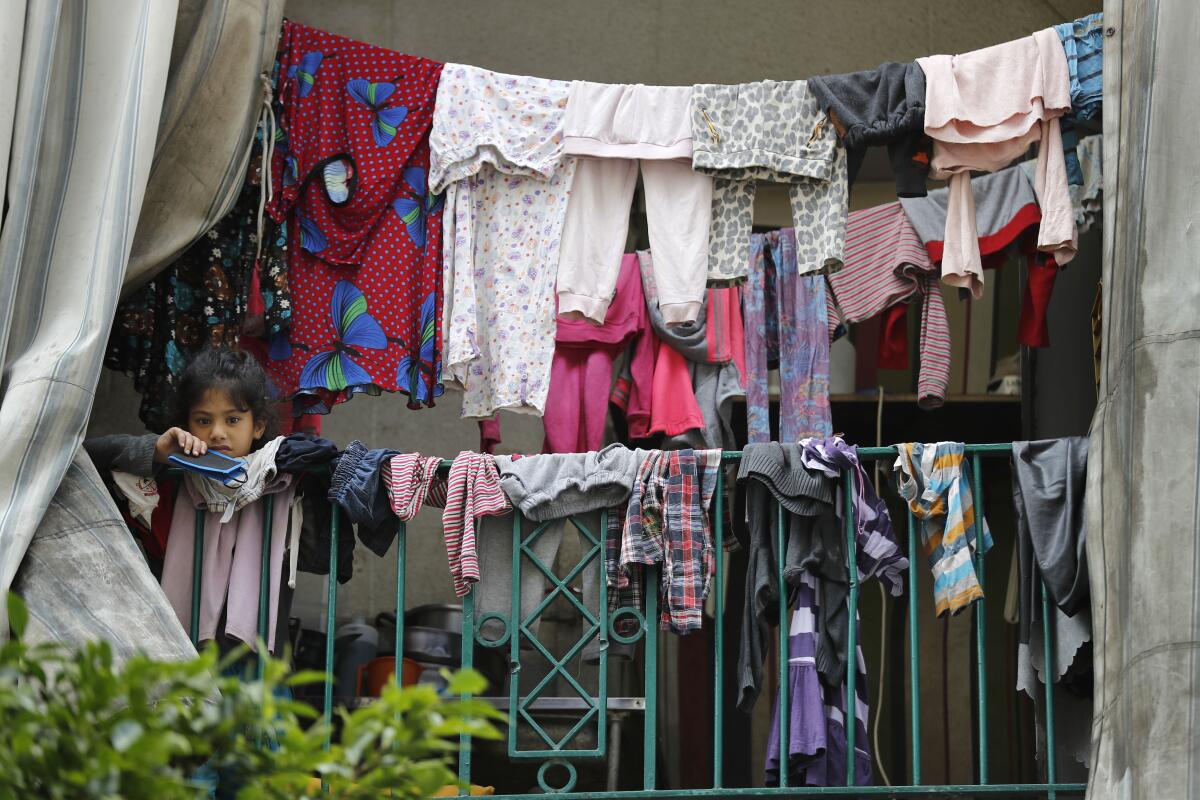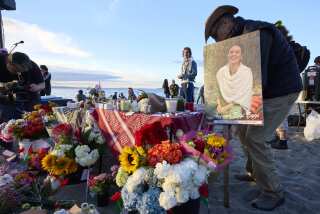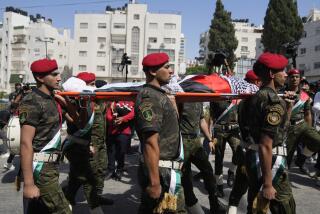Protests in U.S. spur some in Middle East to look in the mirror

- Share via
BEIRUT — Early in life, Maryam Abu Khaled saw that she was treated differently than others. As a child in her West Bank hometown of Jenin, the Black Palestinian had schoolmates who wouldn’t sit beside her, fearing her color would rub off on them. Mothers of friends would warn their kids to stay out of the sun so they don’t “get burned and become like Maryam.” A family refused to marry their son to one of Abu Khaled’s friends because the woman was too dark-skinned.
“I just thought, ‘I have darker skin than she does. What would they say about me?’” Abu Khaled, 29, said in a phone interview
Which was why, when cries of solidarity rose in the Middle East in support of African Americans after the death of George Floyd in Minneapolis, Abu Khaled came out with a message.
Police might not be attacking Black people in the Middle East, she said in an Instagram video earlier this month that has been seen more than 1.3 million times. But she then launched into a recitation of the racist comments and jokes she has heard over the years.
“Do you know these things you say as a joke smashed the spirit of the person in front of you and shattered their self-confidence? No, you don’t,” she said.
Just as Floyd’s death has re-energized the focus on racism in America, it has also thrust a lens on discrimination against Black Arabs and other minority communities in Middle East societies. And there’s a lot to see.
By and large, there are no government initiatives in the Arab world to counter anti-Black discrimination; a 2018 media law in Egypt banned racist content but has so far had little effect. Economic prejudices play out daily against migrant workers from poorer nations of Africa and South Asia. And while homosexuality is legal in Bahrain, Iraq and Jordan, most countries do not safeguard gay rights and societies remain overwhelmingly anti-LGBTQ, with religious authorities often depicting homosexuality as a wholly “Western” construct.
Across the Arab world, Black people face the same casual prejudice that Abu Khaled spoke of. Television shows regularly feature a Sudanese or dark-skinned character played by an actor in blackface for laughs. Migrant workers from Ethiopia and other countries, who form the backbone of the construction industry in Gulf nations and blue-collar work in countries such as Lebanon, face slave-like treatment.
Amid the blood-soaked chaos of Libya’s conflict, the actual slave trade endures, with African refugees bought and sold while being used as cannon fodder. It’s even in the language: A commonly used word in Arabic for a Black person is “abed,” meaning slave.
That’s just one of the words Omar Tom, the Sudanese founder of Dukkan, a Dubai-based media company, heard by the time he reached high school.
“Slave, the black guy, the N-word or, whenever a new hip-hop music came out, the bling-bling guy,” he said in an Instagram video he released earlier this month calling out racism in the region.
That dismal record continued even in some of the expressions of support that came out after Floyd’s death. Some celebrities, including Moroccan actress Mariam Hussein and Algerian singer Souhila Ben Lachhab, uploaded pictures of themselves in blackface with the #BlackLivesMatter hashtag. (They subsequently deleted them after an online backlash.)
“Us Arabs, we don’t have racism,” Hussein said in a later post. “Black, white, we are all the same.”
Tania Saleh, a Lebanese singer, went further: She posted a photo of her face superimposed onto a picture of Dominican American singer Amara La Negra that she found on Pinterest.
“I wish I was black because my idols in music and dance are black, all the athletes I respect are black. … I love their culture and respect their art, it is as simple as that,” Saleh wrote. She refused to delete the image despite widespread calls for her to do so.
Beyond the tone-deaf expressions of solidarity, there has been fresh scrutiny of the “kafala,” or sponsorship system, which legally binds the millions of migrant workers in the region — many of them from countries such as Ethiopia, Bangladesh and the Philippines — to their employers and has been described by rights groups and others as modern-day slavery.
Under the system, only employers have the power to terminate the contract, while exercising full control over employees’ movements and presence in the country. It also puts a price tag on the nationalities of various domestic workers.
“Even in the salary there’s racism,” said Nouna Roukoss, head of advocacy at Caritas Lebanon, a Catholic development and relief agency. “[It’s] $150 to $200 a month for someone from Bangladesh. Ethiopians get $200 to $250. Workers from the Philippines get $400, and even that isn’t minimum wage.”
The kafala system has long been a public-relations black eye for Middle Eastern nations, with millions of laborers — who build the glitzy boulevards of Gulf cities, raise the children of the middle class and pick up their trash — facing rampant abuse. And it’s been exacerbated by the economic devastation wrought by COVID-19, with the economic downturn leading to hundreds of thousands of workers being let go all over the region.
In Lebanon, which has an estimated 250,000 migrant workers and which is in the throes of a banking crisis that has seen the currency lose two-thirds of its value in recent months, dozens of Lebanese, no longer able to afford what meager wages they had paid their domestic workers, simply dumped them with their belongings in front of their respective countries’ consulates.
“Many of these women showed up without their passport. Their employers had taken them and now we have legal follow-up to get those documents,” Roukoss said.
It took another death besides Floyd’s to put the spotlight on other kinds of bigotry coursing through the region. Earlier this month, Sara Hegazi, a 30-year-old Egyptian lesbian activist, took her own life in Canada.
It was the end of a years-long journey of abuse that began in Cairo in 2017, when Hegazi unfurled a rainbow flag at a concert of the Lebanese band Mashrou Leila, whose frontman is gay. The move got her arrested “for inciting debauchery.”
Though homosexuality is not illegal in Egypt and many other Arab states, it’s very much taboo, and Hegazi and dozens of others proved an easy target, said Timothy Kaldas, an Egyptian analyst.
“Moral issues have long been a crutch Arab governments lean on when they want to distract public anger and make them focus on something that doesn’t cost them anything,” Kaldas said. “There’s no political cost to repressing the LGBTQ community in Egypt.”
During her imprisonment, Hegazi later wrote, she was put in solitary confinement, and guards tortured her with electric shocks and encouraged other prisoners to sexually harass her.
She was released three months later, but the backlash continued, with Hegazi losing her job and abuse hurled against her online. She fled to Canada and claimed political asylum, but the damage was done, said Shrouk Attar, an Egyptian-born LGBTQ activist now living in Britain who was friends with Hegazi.
“I could see her sanity slipping away after prison. She knew no one in Canada. She was lonely,” Attar said in a phone interview.
Reactions to Hegazi’s death mirrored the bigotry she faced in life. Across social media websites, many said that she had gotten what she deserved for her sexuality as well as her religious and political views and that she wasn’t worth the outcry.
“You should see the comments on her pictures now,” Attar said. “They have no mercy. She’s dead.”
Attar credits Hegazi with drawing attention to the issue of discrimination against gay people, but at a horrific cost.
“Her waving the flag started a conversation that wasn’t there, with people seeing something as important which they didn’t see before,” Attar said.
“And I think it will put some pressure — I don’t know how much. But it shouldn’t be worth my friend’s life.”
More to Read
Sign up for Essential California
The most important California stories and recommendations in your inbox every morning.
You may occasionally receive promotional content from the Los Angeles Times.











